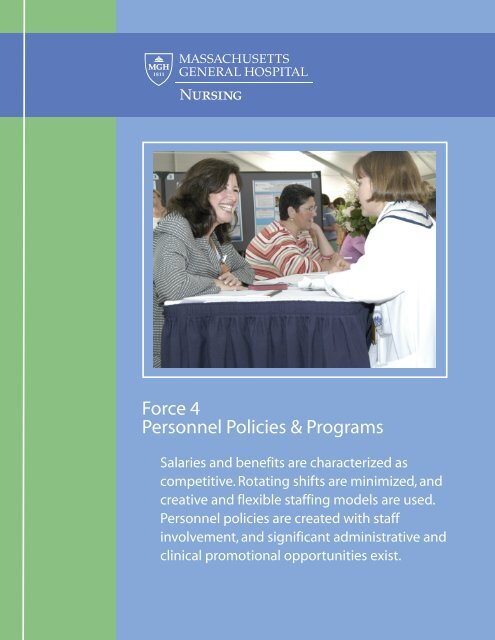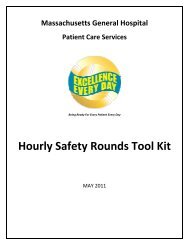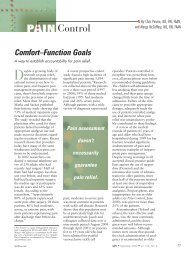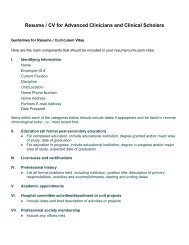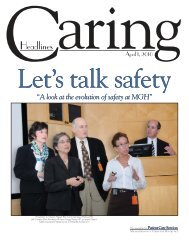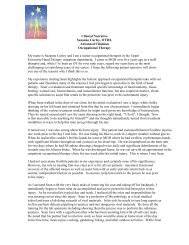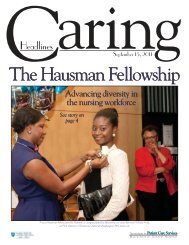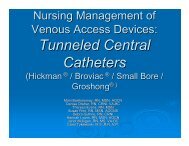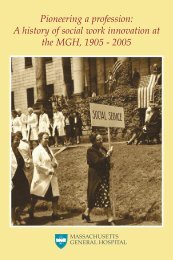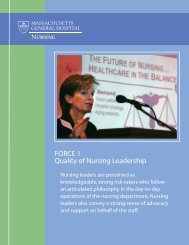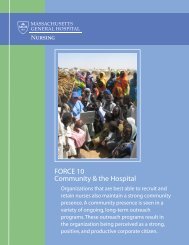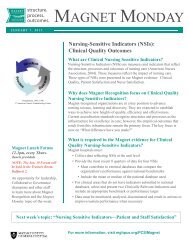Personnel Policies & Programs - Patient Care Services
Personnel Policies & Programs - Patient Care Services
Personnel Policies & Programs - Patient Care Services
Create successful ePaper yourself
Turn your PDF publications into a flip-book with our unique Google optimized e-Paper software.
Force 4<br />
<strong>Personnel</strong> <strong>Policies</strong> & <strong>Programs</strong><br />
Salaries and benefits are characterized as<br />
competitive. Rotating shifts are minimized, and<br />
creative and flexible staffing models are used.<br />
<strong>Personnel</strong> policies are created with staff<br />
involvement, and significant administrative and<br />
clinical promotional opportunities exist.
EXECUTIVE SUMMARY FORCE 4: PERSONNEL POLICIES AND PROGRAMS<br />
Salaries and benefits are characterized as competitive. Rotating shifts are minimized, and<br />
creative and flexible staffing models are used. <strong>Personnel</strong> policies are created with staff<br />
involvement, and significant administrative and clinical promotional opportunities exist.<br />
Massachusetts General Hospital has a long history of supporting and recognizing employees<br />
as evidenced in its policies and practices that support employee education, training, and professional<br />
development; in rewards that recognize exceptional employee performance, special<br />
accomplishments, and length of service; and in competitive wage and salary programs. For the<br />
second consecutive year, MGH has been recognized by the American Association for Retired<br />
Persons (AARP) as a “Best Employer” and Working Mother Magazine as one of the top 100<br />
companies for working women.<br />
MGH and PCS leaders appreciate the challenges and significant impact of shortages in<br />
nursing and other clinical role groups, and believe that being positioned as the “Employer of<br />
Choice” in the Boston health care community is essential. This inevitably involves multiple<br />
strategies aimed at both recruitment of new staff and retention of current employees which are<br />
detailed throughout this Force. For <strong>Patient</strong> <strong>Care</strong> <strong>Services</strong> (PCS) employees this includes competitive<br />
wage programs, supportive work environments, recognition and rewards programs, and a dedicated<br />
PCS Human Resource team. The Department of Nursing, Human Resources and Compensation<br />
and the Budget Office work collaboratively on many areas but particularly around issues related to<br />
wage and salary and employee compensation, evaluating salary ranges for all PCS clinical and<br />
support roles.<br />
The Hospital’s marketing campaign and general recruitment efforts have a high level of<br />
direct care staff involvement. With the support of Human Resources, Nursing Directors have the<br />
authority and accountability for staff selection and retention. This unit level accountability for hiring<br />
into approved positions has been extremely effective. Typically, the Department of Nursing begins<br />
the fiscal year with a Staff Nurse vacancy rate of about 5%, primarily a result of newly-approved<br />
positions. As the year progresses that vacancy rate generally falls to about 1%. Retention rates are<br />
impressive as well with the overall rate of direct care Staff Nurse turnover at 4.6% for FY06.<br />
The organization’s success reflects its culture of valuing and appreciating employees;<br />
organizational policies that consider a balance of patient and staff needs; a well defined competency<br />
program for all direct care staff; and a strong commitment to, and utilization of, a patient<br />
classification system to assure adequate staffing levels based on patient, staff and unit variables.
MGH has a number of policies that address employee rights and promote a safe and healthy<br />
work environment. These include Human Resource policies on violence in the workplace,<br />
harassment, sexual harassment and substance abuse; Administrative policies on firearms and<br />
weapons; and Privacy and Security policies defining violations of privacy and security and<br />
procedures for reporting. Massachusetts General Hospital (MGH) is also committed to creating an<br />
environment of mutual respect and understanding. It is defined in the Hospital’s Diversity Plan and<br />
personnel policies. This information is disseminated in orientation, via E-mail and is readily<br />
available on-line.<br />
Staff Nurses strive to provide excellent care to patients and maintain control over their<br />
practice. An essential enabling element is adequate, flexible staffing with an effective RN mix. The<br />
QuadraMed WinPFS Productivity and Benchmarking system has been used at MGH for over 20<br />
years and is considered a credible tool for predicting and justifying direct care resources to both<br />
nursing staff and those outside nursing; such as, administrators and financial officers. A targeted<br />
workload is established for each patient care with inherent flexibility. Examples provided in this<br />
Force demonstrate staffing decisions and patient care assignments are based on patient needs –<br />
current volume, anticipated turnover, projected admissions, patient acuity and nursing care<br />
requirements – and staff requirements – skill level, experience, work schedules, availability,<br />
minimum staffing requirements and reasonableness. Additional staffing resources are described as<br />
well.<br />
For Staff Nurses, the primary issue in work-life balance is the ability to maintain some level<br />
of control over their work schedules. Although there is no “standard” staffing pattern across the<br />
units, there are guidelines appropriate for the patient population on each unit. Within those<br />
parameters, Staff Nurses have maximum flexibility in creating schedules that promote work-life<br />
balance. The Professional Exempt status of the nursing staff provides a level of flexibility that allows<br />
for consideration of staff needs and preferences while still providing for appropriate resources to<br />
meet patients’ needs for nursing care.<br />
Performance evaluation is an integral part of the life of the organization. In addition to the<br />
ongoing dialogue that occurs on a day-to-day basis between employee and manager and among<br />
peers and colleagues, formal, written performance appraisal is required for every employee annually.<br />
Nursing’s performance appraisal process is strongly influenced by the vision, values and strategic<br />
direction of the department; the focus on patient- and family-centered care; the commitment to<br />
clinical excellence and the narrative culture that define nursing at MGH. Annual performance
appraisals are a time to reflect on the previous year and establish goals that support the strategic plan<br />
of both the organization and department. In addition, 360 o evaluation has been implemented for<br />
both the Nursing Directors and the Clinical Nurse Specialists as a means of assessing current<br />
knowledge and skills to create a meaningful leadership development program.<br />
As articulated in the hospital’s mission statement, MGH is committed to educating leaders in<br />
the health care profession. Supporting career development for employees enables the organization<br />
to attract and retain a highly skilled and diverse workforce, as it strives to meet its goal of providing<br />
the highest quality of care to patients. The Clinical Recognition Program reflects the narrative<br />
culture embedded in practice at MGH. The first-of-its-kind interdisciplinary advancement model,<br />
the Clinical Recognition Program celebrates acquisition of clinical expertise over time. It was<br />
designed to recognize and reward clinicians who choose to grow their practice at the bedside.
TABLE OF CONTENTS<br />
Volume 3<br />
Force 4: <strong>Personnel</strong> Polices & <strong>Programs</strong><br />
Sources of Evidence<br />
4.1<br />
4.2<br />
4.3<br />
4.4<br />
4.5<br />
4.6<br />
4.7<br />
4.8<br />
4.9<br />
4.10<br />
4.11<br />
4.12<br />
4.13<br />
4.14<br />
4.15<br />
4.16<br />
4.17<br />
4.18<br />
Pages 1-21<br />
Pages 22-38<br />
Pages 39-66<br />
Pages 67-76<br />
Pages 77-119<br />
Pages 120-129<br />
Pages 130-139<br />
Pages 140-143<br />
Pages 144-147<br />
Pages 148-155<br />
Pages 156-165<br />
Pages 166-174<br />
Pages 175-182<br />
Pages 183-202<br />
Pages 203-210<br />
Pages 211-216<br />
Pages 217-227<br />
Pages 228-240


